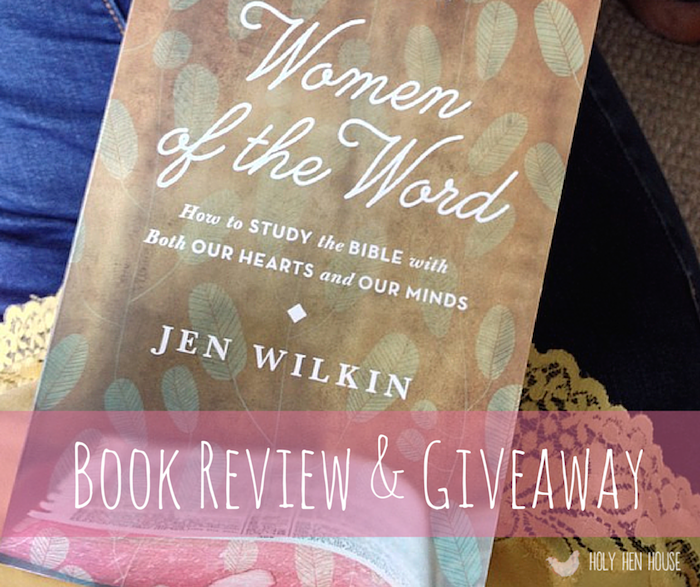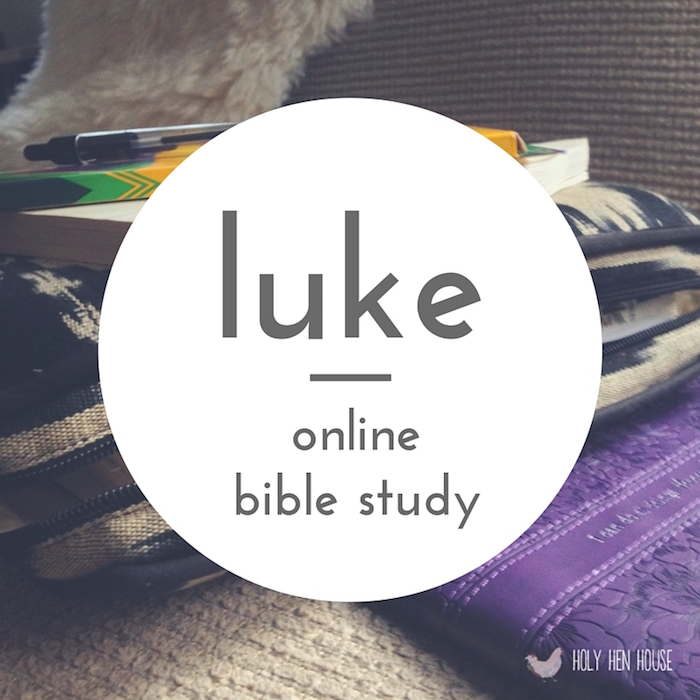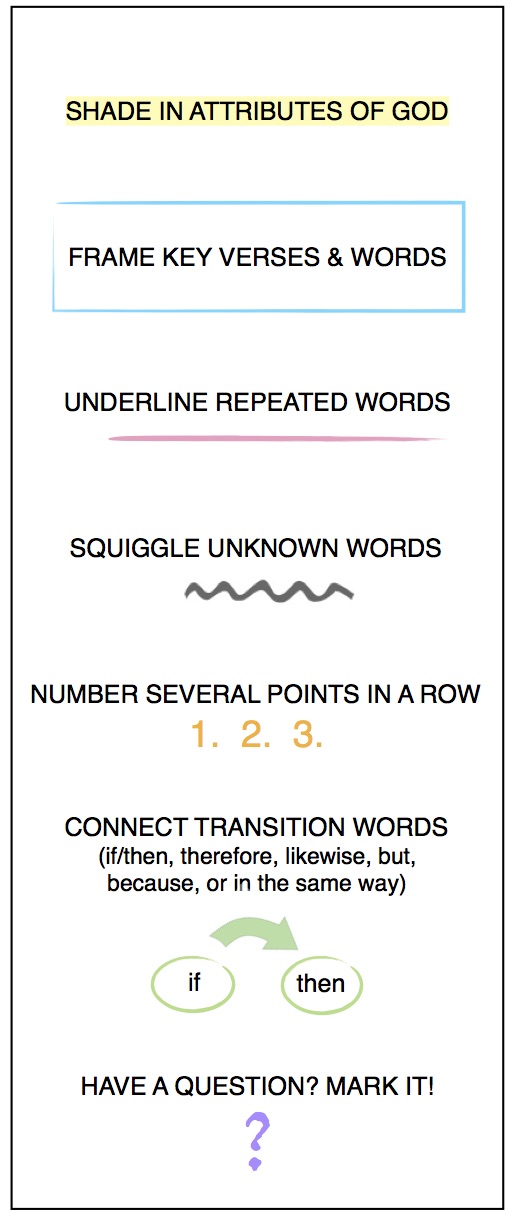Women of the Word by Jen Wilkin // Book Review & Giveaway
 When I remember my Grandma I picture her at her desk. She would be found there squinting at her large-font Bible placed under a magnifying glass lamp. Throughout her life she had created strong habits of bible study so when her macular degeneration kicked in it didn't hold her back. Even though her eyes were failing her - she was a God-seeker.
When I remember my Grandma I picture her at her desk. She would be found there squinting at her large-font Bible placed under a magnifying glass lamp. Throughout her life she had created strong habits of bible study so when her macular degeneration kicked in it didn't hold her back. Even though her eyes were failing her - she was a God-seeker.
Unlike my Grandma, I have a computer loaded with thousands of bible studies, blog posts, podcasts, sermons, a variety of bible translations, bible passage apps, and by the tap of a finger the ability to zoom in on anything that may need more focus. They are certainly a blessing but they are also overwhelming! All of the Christian resources can be great tools but unless we use them with discipline we get distracted. From the time we are wee little babes, through the tested teenage years, and now as grown women we are told to get in the word, open our bibles, and to spend time with Jesus but very little is spoken on how we should and even more importantly why.
Jen Wilkin, author of Women of the Word: How to Study the Bible with Both Our Hearts and Our Minds
She challenges her readers to not rely on their feelings alone in their faith. When "life happens" our faith will certainly be tested. It is easy to praise God when life is going well but what about when it isn't? A faith based on knowing God and His promises will stand firm!
Do not conform to the pattern of this world, but be transformed by the renewing of your mind. Then you will be able to test and approve what God’s will is—his good, pleasing and perfect will. Romans 12:2-3
Jen calls women to join her in growing in Bible literacy. Does any of this sound familiar?
"We all carry around the dim discomfort of our not-knowing, feeling it surge to the surface when we enter into conversations with the unbeliever, the friend in our small group, the wise older woman. Sometimes when a category on Jeopardy covers a Bible topic, we experience a moment of sheer panic that Alex Trebek knows his way around our sacred text better than we do. We should be hard-pressed to name the twelve apostles or to give the order of the creation story. We have heard of Tamar; but was she a positive example or a negative one? When two preachers we love take differing positions on the same passage, we are thrown into confusion" (p.36)
Bible literacy is more than knowing bits and fragments of bible facts, passages, and clichés. It is an understanding. As we grow in our Bible literacy we start to revel in how the gospel shows itself present throughout the entire Bible. Growing up I often heard "Don't believe something because someone tells you. Search God's Word. His sheep know His voice." Jen Wilkin echoes this, "Bible literacy matters because it protects us from falling into error." (p.45)
She doesn't just tell us to "get in the Word" she shows us how. She doesn't exaggerate or tell us that studying God's Word for ourselves is a piece of cake. She looks us in the eye - and like most things that are valuable - tells us that this is going to be hard work but oh so worth it. Back to school time? You bet! Time to use big words like metanarrative and exegesis, ladies.
Five P's of Sound Study
1) Study with Purpose. "We consider how the metanarrative of creation-fall-redemption-restoration acts as the Big Story that guides and informs all the small stories." (p. 54)
2) Study with Perspective. We dig for the original historical and cultural context. This is exegesis. We answer questions using our bibles and trusted commentaries. Who wrote this section of God's Word? When was it written? To whom was it written? In what style was it written? Why was it written?
3) Study with Patience. We like instant results with the least amount of input as possible, right? "But learning the Bible requires discipline, and discipline is something we don't naturally embrace... If we give in to impatience with the learning process, we tend to react in one of two ways." Jen warns us against giving up or looking for shortcuts. Being confused or challenged is uncomfortable but a necessary part of the learning and growing process!
How can those of us in the hard pressed stages of early motherhood, an exhausting diagnosis, or grief study God's Word without the guilt that we aren't doing enough? Jen Wilkin is reassuring here, "Some months, just keeping body and soul together for myself and my family seemed to occupy almost every moment. I don't consider those months to have been lost time or setbacks to my growth. They were times to employ patience, not with active learning of the Scriptures, but with waiting on the Lord. They deepened my desire for study... Trust that the Lord knows your circumstances better than you do and that he sees your desire to learn and grow. And trust that those times are being used to mature you..." (p.83)
4) Study with Process. Here is where we pull up our sleeves and get ready to dig. Before we can apply God's Word we first have to be able to comprehend it and interpret it correctly. Jen suggests the following tools and questions to ask during Bible study:
a) What does it say?
1. Read the text: Reading books of the Bible verse by verse ensures that we aren't missing the context or the Big Story in the little story. Jen recommends that we print out God's Word so that we have room to write notes and mark it up. I realize that this can take up a lot of time, paper, and ink. There are several options here: Buying a large print Bible with plenty of space, a journal Bible that has writing space in the side margins, or printing Bible sections double spaced from BibleGateway.com and placing them in a binder.
2. Read repetitively: Before we study a section of God's Word Jen recommends that we read it in context each time so that we fully understand the meaning. Studying God's word this way also helps with memorization.
3. Annotate: Mark up the text! Is something repeated? Underline it. Is something confusing? Write a question mark. Is there a transition word? (if/then, therfore, but, because, or in the same way) Draw an arrow connecting it to it's conclusion.
4. Define: For deeper understanding look up words in our English dictionary or even the original language of Hebrew or Greek here.
5. Compare translations. Perhaps your Bible is New International Version (NIV) and you'd like to compare it to English Standard Version (ESV) or the New King James Version (NKJV). What are the differences? Are they significant?
6. Outline: Write down the main points and the sub points as a general outline of the text.
b) What does it mean?
1. Cross Reference: I love that Jen references "let Scripture interpret Scripture" as her guide and not herself!
2. Paraphrase: Can we put what God says in our own words?
3. Interpret the text by yourself first and then seek out commentaries. "God gifts certain people among us with unique knowledge and understanding, and we would be fools to overlook their contributions to our study... But we must always keep in view that each of us individually is called to love God with our minds." (p.96)
c) How should it change me?
1. What does this passage teach me about God?
2. How does this aspect of God's character change my view of self?
3. What should I do in response?
5) Study with Prayer. Last but not least! "Prayer is the means by which we implore the Holy Spirit to take up residence in our study time... Learning the Bible does not happen as a result of human effort alone. Like all other aspects of our sanctification, it is the result of the Holy Spirit working in and through our efforts." (pg. 103, 107)
I can't say enough how much I'd love for you all to read this book and especially if you are a bible study leader or teacher. Women of the Word ends with further tips concerning teachers. She reminds us that when it comes to our students, "... our primary goal is to grow their knowledge of and love for God." (p.134)
This kind of bible study is very in-depth. I understand that it may be overwhelming for some. Jen Wilkin's method of bible study is one of many ways to read God's Word. Women of the Word: How to Study the Bible with Both Our Hearts and Our Minds
________
Holy Hen House will be gifting Jen Wilkin's Women of the Word to TWO of our readers!
How can I enter the giveaway?
1. Sign up here to receive our monthly newsletter in your inbox. (If you already receive our newsletter you are set!) 2. Comment below what book of the Bible you would like to study most or what you are currently studying. 3. Join our online Bible study group on Facebook here. (If you are already in the group you are set!)
** You must fulfill all three entries above to be fully entered in the giveaway.
Giveaway ends Sunday night, September 6th at 10pm (CT) and the winner will be announced Monday morning, September 7th.
We have two winners!!! Congratulations Katherine and Rachel T!
Disclosure: I have not been compensated for this review. I purchased this book for myself and read it twice already this summer. This book's awesomeness is my pure motivation in giving it away. This post does contain affiliate links, which means Holy Hen House receives a small percentage of the sale if you make a purchase using the links.
________
Online Bible study begins next week!

Next Monday, September 7th, we will begin our online Bible study on the book of Luke. We will use some aspects from Jen Wilkin's approach to Bible study and combine them with our own.
Here's your assignment to be prepared for next week! Gather these items:
- A Bible without study notes OR print the Bible text double spaced with 12 font and place in a binder.
- Holy Hen House Bible study pdf worksheets. These will be uploaded on the blog every Monday.
- An additional Bible translation to compare (NIV, NKJV, NASB, & ESV are some reliable ones)
- A trusted Bible commentary - I have this one Luke (People's Bible Commentary)

We are women of the Word! We are God seekers!

